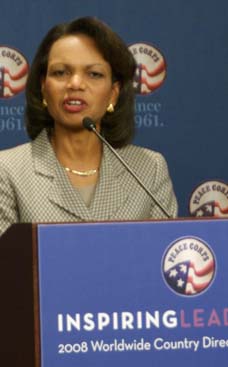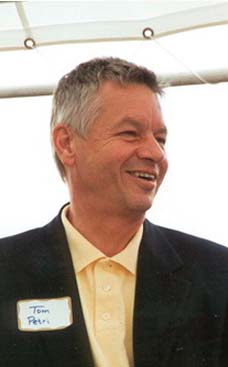
"At this point in my life I'm very interested in the Latin American, but who knows what's going to happen down the line? I have been involved with Yo-Yo Ma's Silk Road Project and will be writing something for them again later this year. But in terms of how deeply connected I feel to Chinese music and culture through my blood - not as much. Maybe because it feels so distant; it's my great-grandfather who was from China. Still, I grew up eating Chinese-Peruvian stir-fry; that's what my mom knew how to cook when she first met my dad. And I can cook great Chinese-Peruvian stir-fry! A lot of multiracial, multiethnic people have the same experience. People like myself . . . like to romanticize the motherland we've not visited yet. It's a shock when we go and we realize, "Oh my God, I'm such a gringa." I get sick from the food, or I don't understand the customs. And there are other moments when I feel so connected." Gabriela Lena Frank's musical influences come from her own polyglot background. Her mother is Peruvian, her father is descended from Lithuanian Jews, and she grew up in Berkeley, California. Her parents met when her father was a Peace Corps worker in Peru in the 1960s.
An interview with Composer Gabriela Lena Frank
Composer combines classical with the folkloric
MUSIC@MENLO OFFERS MULTICULTURAL WORKS
By Richard Scheinin
Mercury News
Article Launched: 07/13/2008 01:39:41 AM PDT
Composer Gabriela Lena Frank is the daughter of a Chinese-Peruvian mother and a Jewish-Lithuanian father. She is one of the new breed of composers, combing the wide world beyond the conservatory for musical influences - which, in her case, cropped up pretty much right inside the home.
Born and raised in Berkeley, Frank, 35, has been racking up commissions for new works, from Carnegie Hall to Yo-Yo Ma's Silk Road Project.
One of her works-in-progress is "Cifar and the Sweet Sea," a bounteous song cycle with texts from Nicaraguan poetry and myth: tales of seafaring adventure, an oracle, an island of Sirens. "It's Homer, with a Nicaraguan flair," she says.
Selections from "Cifar" will have their first West Coast performances Aug. 7 and 8 at St. Mark's Episcopal Church in Palo Alto, when the Music@Menlo chamber music festival presents a program titled "Music Now: Voices of Our Time."
The Menlo festival actually kicks off this weekend with music by Handel, Bach and Vivaldi - but in the new, wide musical world, Frank is hot on their heels.
I recently talked to Frank about genes, music and what it means to be a composer in the 21st century.
Q Do you consider yourself a classical composer?
A People like me are making that term problematic. When I introduce myself to people, I say I'm a classical music composer, but that I draw on a lot of folkloric South American music,
Advertisement
and people think I'm super-cool as a result.
Q Super-cool? That's a new adjective for a composer. Why do you think?
A Look at the times that we're in. In California right now more than 50 percent of the babies being born are Latino. Everybody has their favorite Mexican restaurant.
Q What about the "classical" part of your job description?
A People are fine about it. And I'm very proud to be following in the footsteps - Bartók is my hero. Ravel and all the titans. But I think there are equally tremendous folkloric musicians we haven't heard of.
Q Who's your top titan?
A If I had to pick one to go out for a beer with, it would be Bartók.
Q When did you start exploring Latin American music and culture?
A About 10 years ago, in a serious way. But off and on since I was a little girl. In Berkeley in the '80s, a lot of Bolivians and Peruvians played at all these venues near where I lived. And it was my favorite music. It wasn't classical music; we didn't even go to the San Francisco Symphony, though I took piano lessons all my life. And I liked Bach, but only because I loved the Prelude in C. It just grabbed me.
Q What music did your parents listen to?
A My dad (Michael Frank) is really into Gershwin. He's a Mark Twain scholar at Berkeley, so we're all big readers. My mom (Sabina Frank) is a stained glass artist; she has her shop out on Fourth Street, Berkeley. My brother inherited her talent - though he became a neuroscientist.
Q Do you feel you're erasing boundaries between classical music and folkloric music?
A I'm a small part of a big movement. We have more Latinos coming into classical music now, and I find that very exciting. I can say, "What do you think of this and that?" I think what I'm doing might come from a private wish to understand my own mixed ethnic and racial background.
Q Are you equally interested in your Chinese and Jewish-Lithuanian roots?
A At this point in my life I'm very interested in the Latin American, but who knows what's going to happen down the line?
I have been involved with Yo-Yo Ma's Silk Road Project and will be writing something for them again later this year. But in terms of how deeply connected I feel to Chinese music and culture through my blood - not as much. Maybe because it feels so distant; it's my great-grandfather who was from China.
Still, I grew up eating Chinese-Peruvian stir-fry; that's what my mom knew how to cook when she first met my dad. And I can cook great Chinese-Peruvian stir-fry!
Q You've described yourself as simultaneously feeling outside and inside Latin American culture.
A A lot of multiracial, multiethnic people have the same experience. People like myself . . . like to romanticize the motherland we've not visited yet. It's a shock when we go and we realize, "Oh my God, I'm such a gringa." I get sick from the food, or I don't understand the customs. And there are other moments when I feel so connected.
But it's because of the uncomfortable areas - that's where you grow, as you resolve the discomfort.
Q How are the areas of discomfort connected to your music?
A It's the absolute reason for the music. Every piece is because of something I'm wondering about. And that's why I feel that I have an inexhaustible source of material for the rest of my life.
Music@Menlo chamber music festival
mercurynews
Where: At venues in Palo Alto and Atherton
When: July 18-Aug. 8
Music by Gabriela Lena Frank: Will be performed Aug. 7-8 in Program V: "Music Now: Voices of Our Time" (which also includes music by Jennifer Higdon, Kenneth Frazelle and Tan Dun) at St. Mark's Episcopal Church, 600 Colorado Ave., Palo Alto
Tickets: Each program $32-$70, $10-$35 students; subscribers to six or more events get a 10 percent discount; (650) 331-0202, www.musicatmenlo.org
Information: www.musicatmenlo.org









